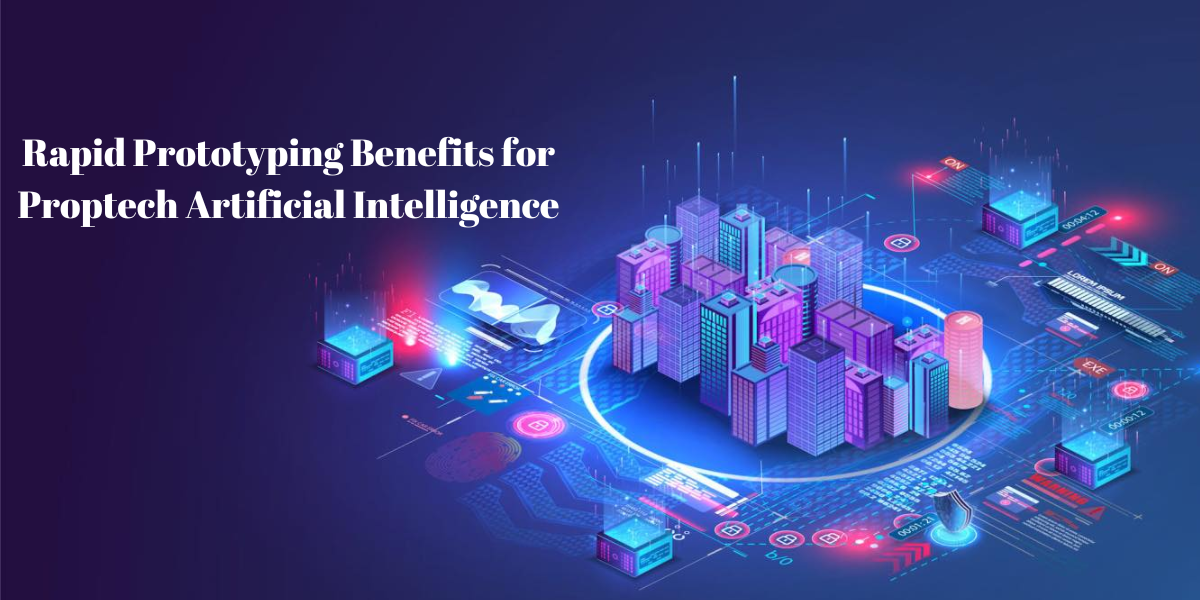The real estate industry is experiencing digital acceleration that affects its operations and significantly impacts its expansion. One of the significant trends to be attributed to this increase is the rise in prop-tech Artificial Intelligence solutions.
JLL forecasts a brighter future for businesses that invest in artificial Intelligence and calls AI “the most influential technology in the proptech scene.” The property management firm estimated that the capital prop-tech companies raised for AI companies amounted to $4.2 billion by 2022, more than double the sum taken in the previous year.
Although technology-related property investments have decreased from 2023 to the previous times. AI is the only exception, bringing numerous productivity and budget-friendly improvements for the overall market.
Companies planning to build proptech AI solutions with the help of Artificial Intelligence Consulting Services for real estate firms must quickly bring them to the marketplace. This is why speedy prototyping in prop-tech is crucial for early adopters. It allows for rapid feedback gathering and iterative design that leads to designs centered around the user. This will not only help validate the product’s marketability and minimize risk, but it will also increase the time to launch.
What Is Proptech AI
Proptech refers to property technology. It is a collection of the latest technology devices used in the real estate market to market, research, sell, purchase, and oversee property. Proptech aims to enhance real estate transactions, improve operations efficiency, and improve the experience of purchasers, sellers, tenants’ agents, and the property management company.
Proptech is broad, continually developing, and providing plenty of possibilities. It doesn’t matter if it’s installing smart thermostats or providing digital rent payment options for commercial property owners. Investors can use prop-tech to make more educated decisions, run their properties better, and get an edge in the market.
Proptech technology that is cross-industry benefits everyone involved. Investors, developers, and even property management firms – which is why it has become a trend in commercial real estate. PropTech real estate companies seek to make the property industry (especially within high-density cities) superior, efficient, and more straightforward to manage for all involved. This is why New York is a leader in this booming industry, with numerous issues related to real estate, such as the absence of affordability and housing units. The industry’s growth is a sign of the necessity to make a mental and technological shift to deal with consumer complaints.
The real estate market is the most significant investment segment in the US, which is why new ideas emerge constantly across the sector. From coworking to coliving, the market for real estate is continually evolving, and strategies are being rethought to satisfy the demand. Since 2014 it has been evident that the PropTech segment has been seeing a significant increase in its growth.
History of PropTech and Its Impact
Despite the current craze in its popularity, PropTech has been developing for a long time. Forbes reports that the 1980s were the beginning of PropTech, especially when real estate firms began seeking more efficient strategies to manage their investments and portfolios. Furthermore, firms began searching for new approaches to issues, such as underwriting and analytics, that led to new ideas in the housing market.
The 2000s were the pivotal year for PropTech’s growth. When the Internet grew, IT companies started shaping the direction of online sales. PropTech companies began to rise to establish themselves as pioneers in the sector. These companies saw the housing sector as a potential hub for disruptive innovation, which led to PropTech’s rapid expansion.
In addition, in the last several decades, technology startups and businesses across the globe have benefited from this lucrative, capital-rich industry because they have overcome obstacles in commercial and residential industries.
What Is Rapid Prototyping?
With 30,000 or more new products launched every year, what can you do to make your business stand out? One of the most effective ways is to use prototyping during the early stages of development. Prototyping refers to developing functional and non-functional examples that help validate ideas, validate designs, and obtain approvals.
It’s the process that puts your most innovative ideas tested. Your concept designs aim to let the team discover what’s working and what’s not and how improvements can be implemented. Learning these essential insights will make the possibility of pivoting when necessary and then creating a product that meets all the requirements of customers and wants from your company.
Skilled AI engineers can make the prototype you design in many ways. Thanks to cutting-edge techniques, engineers who design prototypes can make almost anything you can imagine and transform the idea into a tangible product ready to be evaluated.
Prototyping In Rapid Fashion For Proptech AI
AI is a technology that can potentially change the face of real estate by eliminating bottlenecks common to the development and production chains. Take, for instance, actions on construction sites. In 2022, construction companies suffered a 40 billion dollar loss because of lower contractor productivity. However, estimates suggest that up to 25 billion dollars of this amount could be avoided in the coming years with better management of real estate development.
It is evident how huge the need for proptech is. Proptech helps companies within the industry improve their efficiency. The first companies to introduce prop-tech Artificial Intelligence solutions will receive a rousing reception. To speed up the release of the MVP version of the proptech applications, businesses should look to rapid prototyping and software development.
Benefits Of Rapid Prototyping
Let’s take a look at the numbered lists that provide details on the benefits of rapid prototyping
Rapid prototyping enables entrepreneurs to rapidly design and test new concepts, reducing the duration required to bring a product to market. Through rapid iteration and refinement of prototypes, startups remain ahead of the pack and take advantage of the opportunities in a highly fast-paced business world. Enhances user-centric design through speedy prototyping; users will be able to include users during the process of designing and gather feedback to design user-centric product designs. When they understand the users’ needs and preferences, companies can tailor their offerings to fulfill the expectations of their customers, which results in higher customer satisfaction and adoption rates.
Lowers the Cost of Development
Rapid prototyping can help detect design flaws and usability issues earlier, reducing the need to spend much money on redesigns. Identifying and fixing these issues at the prototyping stage could save time and cash in the future.
Helps to Improve Communication
Prototypes function as physical representations of ideas, making it more straightforward for the company to convey its ideas to the people involved. When pitching investors or co-working with colleagues, prototypes create a shared language that helps improve communication and alignment.
The rapid prototyping process allows them to constantly improve and refine the product in response to user feedback and market research. Through rapid testing and validation of concepts, they can make the right decisions based on data and pivot when needed, increasing the chances of creating a great product.
Rapid prototyping can help reduce the risks involved in launching new products by conducting tests and validating concepts at an early stage of the development process. It is possible to identify potential issues and take action to address them to reduce the chance of expensive failures.
Prototyping Rapidly stimulates you to think out of the norm and discover new ideas. In putting ideas into a tangible way, they can display their imagination and distinguish themselves from the competition, drawing interest from customers and investors.
Proptech AI MVP Design: Key Aspects To Consider
Being in the field of AI-powered prop tech could increase the chances of achieving market success. Like in other industries, it isn’t solely about being one of the very first to launch but also about meeting market demand and ensuring an increase in scalability after reaching the MVP phase.
In addition, ensure you have the following features in you have Artificial Intelligence technology solution:
- Aids users in achieving their particular objectives. Examples include:
- Allowing the management of their properties to be more efficient.
- Improving their tenant and real estate buyer’s satisfaction with their service.
- Offering accurate property valuation.
- It provides an excellent ROI compared to other methods that do not use AI. Discuss how AI can help users spend their money more effectively.
- It allows for easy integration with the different tools utilized by your clients. The users must understand how they can link with internal systems. In this case, you must know what technology and business tools your ideal customer requires to access information in your system.
Proptech AI Has Challenges That Can Assist In Solving Problems
We created a quick list of issues realtors need help to overcome and can tackle if they invest in Proptech Artificial Intelligence.
Risk Management
In conjunction with machine learning, AI software development can mine a vast quantity of data collected across numerous sources to provide insights into new market trends, helping property developers and investors make well-informed business decisions. Through predictive analysis, real estate professionals can also identify potential issues for maintenance, regulatory changes or legal issues, and changing markets.
Fraud Detection
Advanced AI algorithms enhance security using biometric verification (like face recognition) to detect anomalies within mortgage applications and financial transactions. This secure documents, and delivers real-time alerts of suspicious activity.
Reduced Churn Among Tenants
One of the most challenging issues when it comes to property management is keeping tenants from moving out and, at the same time, attracting new tenants to vacant space. As most people like hybrid jobs, it’s challenging for those who live there to use their space effectively, mainly because they cannot reduce the lease. Proptech AI will come in to provide personalized service, effective communication, and swift issue resolution that increase the level of satisfaction for tenants as well as retention.
Optimization of Energy Efficiency
Reducing energy usage reduces costs, ensures compliance with ESG laws, and can positively impact the environment. Artificial Intelligence-powered technologies can track and analyze how buildings use energy, spot areas for savings, and suggest ways to optimize the building to improve efficiency. This is achievable thanks to live data analysis of smart meters, air conditioner IoT sensors, and other information property management systems.
Trending Technologies in PropTech
If you’re reading this, you know that PropTech is an innovative field that uses technology. It can increase the efficiency of various areas of the real estate industry, including property management, investment construction, and others. We will now discuss the top PropTech developments that are changing the world of real estate.
Blockchain Technology
Blockchain technology is now beginning to penetrate real property. It is usually connected to cryptocurrencies such as Bitcoin. It can also change the way we purchase or sell property.
Blockchain, for instance, could be employed to establish an uncentralized database for every property transaction. This would make it simpler to monitor property transfers and ownership and harder for fraudsters to make deals on properties they don’t actually possess.
Blockchain technology could also alter real estate practices by implementing smart contracts. These contracts are saved on blockchains and executed automatically if specific requirements are met. This will make it easier for you to purchase, sell, or rent a property.
Virtual and Augmented Reality
The way buyers and tenants use properties has changed due to the advent of AR and VR. VR technology allows prospective buyers to take a virtual stroll through the house while not physically present. However, AR can provide additional real-time details and information on the property’s location.
The trend could alter the construction industry and other aspects of real property. Virtual walk-throughs of the property could enhance the selling process, specifically for realtors who deal in residential homes.
In addition, visiting construction sites far apart can cut travel time. Commercial space tours assist leasing companies in making better decisions swiftly and efficiently in high-demand markets, in which buildings are typically sold before the site visit can be planned.
Machine Learning
Machine learning studies real estate properties and forecasts market patterns, trends in property values, and rental rates. The technology could reduce the risks of investing in properties by aiding real estate agents in providing more accurate predictions of market trends.
One significant advantage of machine learning in PropTech is its capacity to forecast property value rent rates, property values, and market changes. The machine learning algorithm aids in analyzing trends and patterns that humans cannot identify. By using this data, real estate experts can make better-informed choices regarding selling, buying, and investing in property, reducing the possibility of investing poorly.
Because of these advancements, the world of real estate is evolving and becoming more efficient, flexible, transparent, and customer-centric. When the market for real estate changes, we’ll likely witness more new and innovative technology emerge to address the demands of sellers, buyers, renters, and investors.
Internet of Things
It refers to the Internet of physical objects linked to the Internet. This covers everything from fridges and televisions to thermostats and bulb lights.
In the real estate industry, the IoT could be utilized to build so-called “smart homes” for real estate properties. They are houses that are equipped with various connected devices that are managed remotely. For instance, you could alter the thermostat from your mobile or switch on the lighting before you leave your home.
3D Printing
3D printing is a different technology that is beginning to make an impact in the world of real property. The additive manufacturing process can produce 3D objects using an electronic file. It’s not only for small items – there are 3D printers that print homes.
The technology can be used to construct homes swiftly and inexpensively. For example, a 3D-printed home might be designed to reduce energy consumption or be suitable for people with disabilities.
The IoT is also a great way to gather data on properties. These data can be used to enhance a home’s energy efficiency or to monitor problems with maintenance.
Artificial Intelligence
The equipment employed in the PropTech industry indeed generates vast amounts of information. Through the data generated, Artificial Intelligence can create analyses that aid in risk evaluations, information about the latest trends, and understanding client requirements.
It is essential to be aware that manually processing such a large amount of information can be time-consuming. In addition, PropTech businesses can use AI to quickly analyze huge amounts of data in real time and create valuable insights.
AI is also able to assist clients with the most optimal user experience. It’s changed the ways individuals rent and purchase homes. It is essential to know why this is happening. It is possible to analyze options now based on suggestions from their browsing the past and so on. This is why it explains how things work.
Let’s Sum Up
Even though Artificial Intelligence is only in its initial phases, it’s rapidly advancing. The real estate AI technology market is an unexplored area, which is creating huge opportunities for those who are thinking of ways to make money from AI within the real estate industry.
This isn’t a reason to spend several months thinking about the custom AI solution or developing the fullest-scale, complicated solution. It’s the opposite. Similar to other industries, it is best to start using rapid prototyping to introduce a brand-national product or service that AI powers on the market. It will let you build realistic, interactive prototypes that you can use to get feedback from potential customers and investors.

























